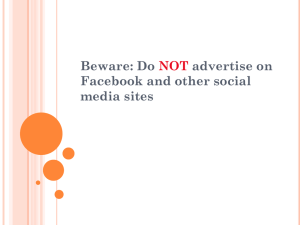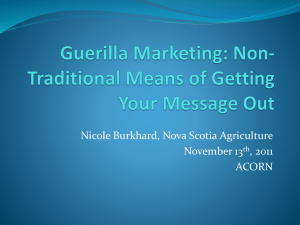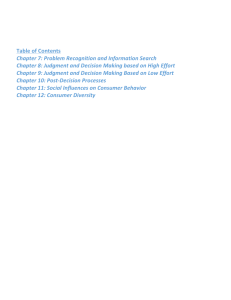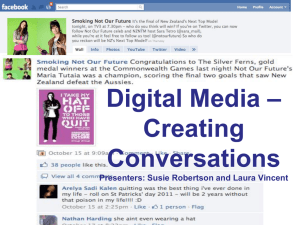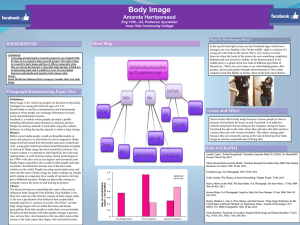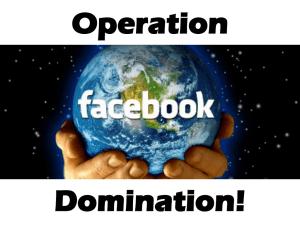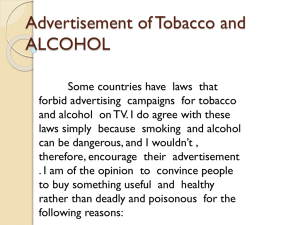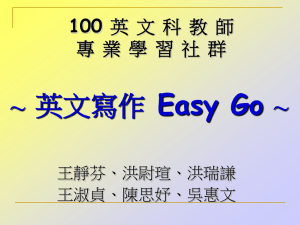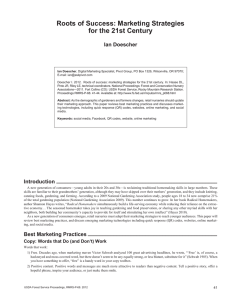Click here to the presentation
advertisement
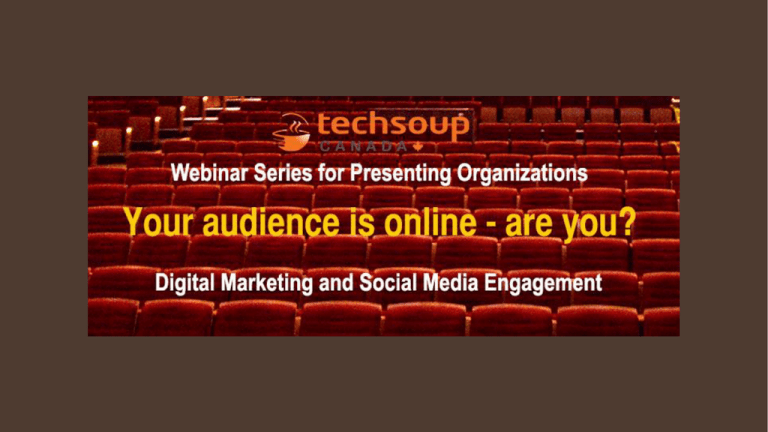
Webinar Series for Arts Presenters Part 1: Thursday, March 20th: Digital marketing 101: What’s it all about? Part 2: Tuesday, April 22nd: Digital marketing 101: What you need to know about websites Part 3: Thursday, May 15th: Digital marketing 101: Being social with social media Presented by: Reminder You can hear us, but we can’t hear you!! Webinar tips Can’t hear? Try turning up your volume Call in or use headphones Have a question? Use the Q&A box Digital Marketing 101 What’s it all about? March 20, 2014 with About TechSoup Canada We help nonprofits use technology to achieve their full potential. Register your organization today to be eligible to request over 300 products from 25 donor partners! https://www.techsoupcanada.ca/en/support/how-to-register Technology Donations Program You may be eligible to get donations of… Is my org eligible? a) Does your business number end in RR0001? b) Do you have a Letters Patent from Industry Canada? c) Are you incorporated as a not-for-profit corporation with your province? d) Are you a library? We create and curate tech resources @techsoupcanada facebook.com/ techsoupcanada feeds.feedburner.com/ techsoupcanada About Me Tierney Smith Program Manager at TechSoup Canada @TierneyS Agenda Why should I be online? Which channels are you playing on? A brief review of marketing basics Nitty gritty of your marketing plan Q&A Key takeaways #1: Your audience is online -> you should be too #2: Pick your channels & make them work together Why should we be online? Canadians are online! Of Canadians use the Internet Of them use social networking Spent online Top sites are Facebook, Twitter, LinkedIn, Tumblr and Pinterest 24.8 hours/month are spent just watching video! All of these numbers are on a steady upwards trend! Sources: 2012 Internet use - http://www.statcan.gc.ca/daily-quotidien/131028/dq131028a-eng.htm http://theexchangenetwork.ca/upload/docs/Canada's%20Digital%20Future%20in%20Focus%202013.pdf Who is online? Of Canadians aged 65 or older use the Internet – up from 40% in 2010 Of low-income Canadians use the Internet, vs 95% of the wealthiest households In metropolitan areas use the Internet, vs 75% outside these areas (This is the biggest increase of any age group) More detailed stats: http://www.crtc.gc.ca/eng/publications/reports/policymonitoring/2013/cmr6.htm Which Channels are you Playing On? Offline channels Newspaper Posters/bulletin boards Radio Word of mouth (can be online or offline) Flyers in schools Bridal/trade shows Brochures Venue programme Website Hub of your online presence Demonstrates legitimacy Recommended minimum content: Who you are Upcoming performances & venues Links to other online channels Contact info Email Best way to communicate with your supporters Use an email marketing service (e.g. MailChimp) Mix visuals and text Link back to more content/info on your website Social Media Mostly for engagement, not promotion Your best opportunity to have 2-way communication with your audience Aim for deeper engagement on a few social media sites Popular networks include Facebook, Twitter, YouTube, LinkedIn, Tumblr, Pinterest Online Advertising Search engine marketing (SEM) = ads related to search engine keywords Google Adwords Google Grants (for charities) Banner ads = ads on other websites Social media advertising Mostly seen on Facebook and YouTube Mobile Mobile-friendly websites, emails & content Best area to invest in Many of your other channels will be accessed via mobile Text-to-donate (for charities) Mobile apps Mobile ads Other Online Channels Location-based information Google Places Online event listings Search “What to do in My Town this weekend” Local bloggers “Multi-Channel” Marketing Your audience doesn’t just use one channel – so neither should you Your channels should work together, complement each other, reinforce messages You are the conductor! (And, often, the instrumentalists…) Credit: http://www.flickr.com/photos/flickr-rickr/ A Brief Review of Some Marketing Basics #1: Assess What channels are you currently using? Both online and offline How do you talk about yourselves? E.g. tagline, mission statement, elevator pitch, “About Us” How would others describe you? Ask 2-3 audience members #2: Define Goals & Objectives Goals - what are you trying to get people to do? Your main goals are likely: Engaging your current audience Reaching a new audience – broadening, deepening & diversifying What are some specific objectives that you can set to help you get there? E.g. Increasing audience members < 45 years old #3: Get to know your Target Audience Create a “persona” for the type of person you want to reach How old are they? What are their lives like? Where do they live? What else do they do for fun? What social networks are they on? Suzy Jones What value would they get from what you do? Recommended worksheet: http://www.johnhaydon.com/2013/02/28/nonprofit-marketing-personas-workbook/ #4: Select your Channels Be wise about choosing channels – only take on what you can maintain It’s ok to experiment with new channels But don’t expect immediate results Send similar messages on different channels that complement each other #5: Craft your Message “You marketing” vs “Me marketing” Focus on what matters to your audience, instead of talking about yourself Share useful, interesting content Strong calls to action Attend a performance Subscribe to our newsletter to hear about upcoming performances Follow us on Twitter to find out about more events in the community Share your thoughts on the performance on our Facebook page Volunteer at next year’s festival Source: http://www.fundraising123.org/files/training/7%20Steps%20to%20Creating%20Your%20Best%20Nonprofit%20Marketing%20Plan%20Ever.pdf #6: Define your Personality If your organization were a person, what would it be like? Fun? Innovative? Creative? Friendly? Witty? Show your personality in all interactions with audience members E.g. Website, social media, posters, box office, customer service Tone may vary slightly depending on the channel Recommended worksheet: http://nonprofitmarketingguide.com/docs/worksheets/NonprofitPersonalityVoiceStyleTone.pdf The Nitty Gritty Build your team & assign roles Marketing can be a team effort If you have multiple people helping, make sure you are: Coordinated (see: content calendar) Consistent (see: define your personality + guidelines) Share great content Just a few examples... Upcoming performances Performance previews Behind-the-scenes insights Blog posts/news articles about the arts Other events going on in the community What do you want to share when? Create a content calendar! Plan the timing of the stages of your campaign Share the calendar with all staff & volunteers Recommended template(s): http://www.bethkanter.org/editorial-calendar-2013/ Guidelines & policies Create consistency around how your organization behaves online Find a balance between structure & trust Recommended worksheet: http://www.idealware.org/reports/nonprofit-social-media-policy-workbook Measure & Evaluate Why measure? You need to know if it’s working (or not!) Contribute to your org’s mission Experiment & learn You need to prove to others that it’s working Leadership buy-in Funding A few common metrics Website Social media Online ads Page views Views/reach Views/reach Time spent on page Engagement/comments Click through rate Shares Email Open rate Click through rate Keep your goal in mind When possible, relate your metrics back to your original goals Conversions = how many people do the action you wanted Challenges to be aware of Multiple channels contribute but only one creates the conversion Often impact is indirect (e.g. increased calls to box office after email blast) Best practice is to set “Goals” using web analytics Questions? Comments? www.techsoupcanada.ca @techsoupcanada facebook.com/techsoupcanada Register for the rest of the series! Part 2: Tuesday, April 22nd: Digital marketing 101: What you need to know about websites Part 3: Thursday, May 15th: Digital marketing 101: Being social with social media https://ccio.on.ca/news/new-webinar-series-arts-presenters More on “You” vs “Me” Marketing You marketing: The kind of communication that centers on the organization. When I pick up your brochure as a prospect, I am learning about you. You are talking about you. You are telling your side of the story. Me marketing: Most people are tuned into what matters to them. They care about messages that speak to their needs. If I pick up your brochure and it is talking about me, I am far more interested. This approach forces you to find the benefits of what you are offering to people. Look at your website and brochures. Do you talk about your mission, your great staff, your awards, your programs? Is it all about you, you, you? How can you change the copy to reflect more "me marketing”? Source: http://www.fundraising123.org/files/training/7%20Steps%20to%20Creating%20Your%20Best%20Nonprofit%20Marketing%20Plan%20Ever.pdf
